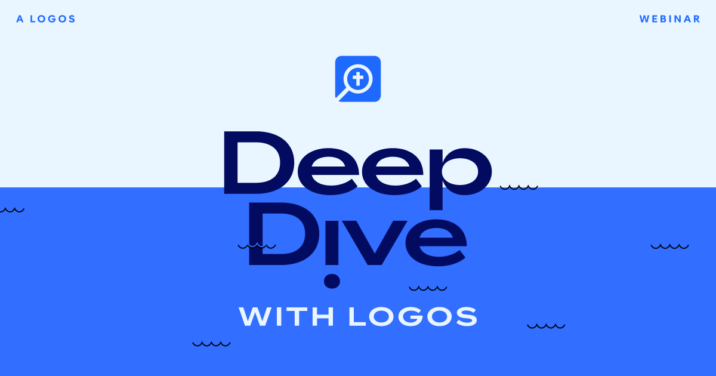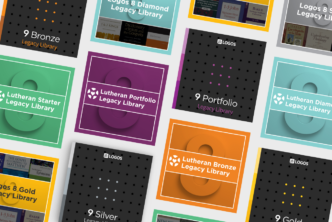About this webinar
When it comes to Bible study, Google isn’t the safest bet. Learn how the Factbook feature in the Logos app pairs with trusted resources to deliver powerful results (without all the garbage).
Webinar replay
Transcript
Hello, I’m Scott. I’m your guide for this new series called Deep Dives with Logos. For over 30 years the mission of Logos [has been] to help people do more and better Bible study—so whether you’re new to Bible study, a parent discipling your children, a seminary student, or a veteran preacher, Logos is an incredible resource.
Now, Logos is the fusion of Bible study tools and a curated library of trusted theological books that work together to help you dig more deeply into God’s Word, and today I’m showing you my favorite feature: Factbook. The reason why Factbook is such a great tool is it’s the one place to start your studies to get quick answers or to dig deeper.
You start with Factbook
For 25 years, I’ve traveled over a million miles and trained and taught hundreds of thousands of people on how to use Logos, and the number one question I hear all the time is “Where do I start?” Well, you start with Factbook.
Now what can you type or find in Factbook? Just about anything related to the Bible or a theological topic.
- Person: Esther, David, Spurgeon, Martin Luther King Jr.
- Place: Jerusalem, Ephesus, Rome
- Thing: God’s omniscience, church history, atonement, marriage, prayer, today’s date to find out what happened in church history, a Greek word, a Hebrew word
- Passage: 1 Peter 1
The other reason Factbook is so useful is because it’s one of the few tools in Logos that is on all your devices—desktop, laptop, your mobile devices, and even the web app. So Factbook should be your go-to place for quick biblical answers—not randomly searching the internet.
So let me show you the all new Factbook. Let me share my screen, and here we are. Now I want you to notice in Logos 10 that Factbook now is right there on the toolbar. That’s how valuable it is—we put it front and center.
So I’m going to click Factbook, and it opens, and you can see that this morning, I was doing a study on God’s omniscience. Now what’s great about this is I’m not that great of a speller so I was able to go into Factbook and type in “omni” and look at the variances that Factbook brings: God’s omnipotence, omniscience, omnipresence.
So again, you select by just typing a few letters—incredibly valuable for studying a place or a person in the Old Testament—some of those names right? So again, give Factbook a couple letters, and we know what you’re talking about.
Key topics and themes
Recently, I did a study on the Trinity. I want you again to see the nuance that Factbook brings: Trinity and Scripture, Trinity in the New Testament, Trinity in the Old Testament. How about doing a study on the historical development of the doctrine of the Trinity?
Okay, so today though, I’m going to study a passage so I’m going to type 1 Peter 1 (you can abbreviate), and again, let Factbook have a few seconds to give you the nuance. Now what I want you to notice is the red ribbon represents the text itself. So in 1 Peter 1, there are four primary pericopes or themes: there’s the greeting, Jesus’s foundation, being holy in all your conduct, and a new birth to a living hope. So if you want to study the text you pick one of those pericopes.
However, notice as well that the Factbook brings me the key topics that can be studied from the text: the church’s holiness, God’s foreknowledge, the preeminence of salvation, God’s holiness, Trinity in Scripture, and so on.
Again, Factbook is giving you a choice: Do you want to study the text, or do you want to study a topic that is in the text?
Now, I’m going to select “be holy in all your conduct,” and right out the gate, it finds a key article. So the top part of Factbook, again, is quick answers. It’s the reason why we sometimes venture out onto the internet because it’s quick and easy. But it’s not a safe or good place to get theological information—that’s what Factbook is for.
So quick answer for a passage—it’s going to be commentary, for a topic—it’s going to be a dictionary or systematic theology or something that is more topical. So here’s the Lexham Context Commentary. I read a couple paragraphs. Notice the “read more” button. Click the “read more” button.
Citations: a fan favorite
Now I’m going to show you a fan favorite. I’ve literally spoken at hundreds of conferences, and every time I show this, you can can hear gasping, hallelujahs, amens. A fan favorite— highlight anything that you find in Logos. Maybe you’re writing, you’re homeschooling, you’re preparing a message, you’re writing a paper for school. Highlight anything in Logos and notice the copy button that automatically appears. I’m going to go into a document and I’m going to paste that in the document, and this is the fan favorite—go to the bottom of the page, and we automatically cite the reference. Now you can actually select what kind of citation style you want—APA, MLA, Turabian, SBL—we’ve got them all.
But how incredible is that whatever you cut and paste out of Logos and will always give you the citation at the bottom of the document.
Media
Now the next section is media. Maybe you’re teaching this particular passage. So we’re going to help with that. So we’ll create artwork for key passages in the text. But notice right here if I click this little button, Logos will provide for whatever book you’re studying. Every book in the Bible we’ll provide a slide deck for that particular letter, book, Gospel, epistle, and so on.
So here’s my title slide for 1 Peter. Here’s the theme of this particular letter. There’s the context. Right here’s a map. We even provide a timeline. I’ve got my historical timeline kind of: what’s going on, the Jerusalem Council, Peter martyred, and so on.
There we have the outline of the particular book and then a blank slide because you’re the one teaching, and you probably need a blank slide to create your own bullet points, teaching points, and what have you.
Dig deeper: layouts, guides, and workflows
So that is brought to the table, and Factbook in the media section. So again top part of Factbook is quick answers, quick access to media, but down here at the bottom is the new section called “Dig deeper.” And there are three sections: layouts, guides, and workflows.
Layouts
Layouts are simply going to arrange on the screen the books you need to accomplish this task. Bible in a commentary? Guess what it’ll open a Bible in a commentary. Bible journaling? Maybe you want some help with your morning time in the scripture, you want to journal, you want to reflect on the passage. So click that, and it will arrange on the screen the books you need to do journaling. So again, Layouts accomplished the task by putting the right books on the screen.
Guides
Guides—this is your research. This is countless hours of Bible study and exegesis for the passage. Or if you’re studying a topic, it’s an amazing amount of work done in seconds.
Workflows
And then workflows—we’ll do a Deep Dive video on workflows. These are the step-by-step methodologies of scholars and pastors and writers.
- We have the Precepts—Kay Arthur’s inductive study methodology
- We have here Dr. Bryan Chapell’s Christ-centered sermon preparation methodology
- We have Dr. Michael Heiser
- We have Dr. Ralph West
So again, these are preachers, pastors, scholars who have spent countless years studying the Bible and have provided to us their methodology. So we get to follow along and study with them.
But I’m going to click the passage guide for 1 Peter 1, and I want you to notice all that is happening in seconds on the right hand side of the screen.
Time savings
You know, people ask me all the time, “Scott, what is the best feature in Logos?” You know, if you got to pick the one best thing in all of Logos, it’s time savings. The best thing Logos does for you is is save you countless hours.
If there was one reason why people give for not being in the Bible more, it’s a time issue. The reason we don’t study the Bible more is “I don’t have enough time.” So Logos does the heavy lifting. It does the page flipping. It finds the information for you.
I want you to notice really quickly all that Logos found in a matter of seconds with the Passage Guide. Commentaries—they’re all lined up. I just have to click the link—that commentary opens, click the link—that commentary opens, click the link—there’s Tyndale. So access to commentaries instantly. Parallel passages, okay? How about where Old and New Testament or quotations happen in the text, and so on. Cross references—the greatest commentary you own is the Bible because Scripture interprets Scripture.
So we’re going to look up the key passages, right, and you can just float on any passage, and it appears on the screen. Important words—we will actually find the key Greek words in the text that you’re studying, and if I wanted to do a study on the word “holy” or hagios, I click the link there, and Logos is doing again countless hours on what that Greek word means in the text with direct links to my Greek dictionary. So if I really want to find out what that word means, and so on so forth. We’ll even pronounce the Greek word for you, or if in the Old Testament we’ll pronounce the Hebrew word.
Thematic Outlines
Scroll down even further, and thematic outlines—if you’re a preacher, teacher these are your preaching outlines brought to the table. I use these for personal Bible study. Recently did this study “attitudes to money.” It was a great study on the theology of money. What does the Bible say about money? So a great little outline on how to either teach or study this particular topic.
Cultural Concepts
Scrolling right along, cultural concepts—you know one of the difficulties in studying the Bible is the disconnect culturally today from a couple thousand years ago. So if I want to do a further study on the new birth or how about the resurrection of Jesus, I just simply click that link. And guess what? Factbook goes and finds all the information on the resurrection of Jesus Christ.
Factbook changes everything
So the Factbook is becoming kind of the center point of Logos where you get your information. Okay, now this isn’t what I’m studying. I’m studying 1 Peter 1. So one little click of the backtrack arrow, and I’m right back where I was again. In Factbook for 1 Peter, but again look at all the information that Logos brought back.
Started in Factbook, and then I opened up the Passage Guide. We even find music. Your systematic theologies all lined up, your biblical theology is lined up, ancient literature—you might be a history buff and you want to go way back to study this particular passage, the church fathers, right? Dead Sea Scrolls, Pseudepigrapha sometimes, Josephus will show up in here as well, right?
So again, look at the countless hours of information that Logos brought back to me simply by starting in Factbook. Got my quick answer up here and then down below when I want to dig deeper, I have access to layouts, guides, and workflows. Factbook is a game-changer, because again, it’s the place to start for a topic for a passage for a Greek word for a Hebrew word. It is my favorite feature in all of Logos.
Next steps
Call a Logos specialist at 888-458-5579 or explore all of our Logos 10 packages. Our most popular packages are listed below. Some of the features above are only available in Gold and above.





